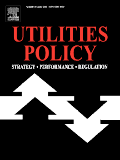
Utilities Policy
Scope & Guideline
Transforming Utility Services Through Scholarly Discourse
Introduction
Aims and Scopes
- Utility Governance and Regulation:
Focuses on the frameworks, policies, and practices that govern utilities, exploring how regulation impacts efficiency, sustainability, and service delivery in energy and water sectors. - Sustainable Energy Transition:
Investigates the pathways and challenges associated with transitioning to sustainable energy systems, including renewable energy integration, energy efficiency, and the socio-economic impacts of energy policies. - Water Resource Management:
Examines the governance, efficiency, and sustainability of water utilities, addressing issues like water scarcity, service quality, and the role of technology in water management. - Economic Evaluation and Financial Sustainability:
Analyzes the economic aspects of utility services, including cost-effectiveness, pricing strategies, and financial mechanisms that support sustainable utility operations. - Consumer Behavior and Acceptance:
Studies the factors influencing consumer behavior towards utilities, including acceptance of new technologies, pricing policies, and sustainability initiatives. - Impact of Climate Change and Environmental Policies:
Explores the implications of climate change on utility operations and the effectiveness of environmental regulations in promoting sustainable practices.
Trending and Emerging
- Decentralized Energy Systems and Prosumers:
There is a growing emphasis on decentralized energy systems, including the role of prosumers (consumers who also produce energy), which signifies a shift towards localized energy solutions and community engagement in energy management. - Integration of Technology and Data Analytics:
Emerging themes include the application of advanced technologies such as IoT, machine learning, and big data analytics in improving utility efficiency, service delivery, and consumer engagement. - Climate Resilience and Adaptation Strategies:
Research focusing on how utilities can adapt to climate change impacts is gaining traction, emphasizing the need for resilience planning and sustainable resource management in the face of environmental challenges. - Social Equity and Inclusivity in Utility Services:
There is an increasing focus on social equity, addressing how utility services can be made more inclusive, particularly for marginalized communities, and how policies can mitigate energy and water poverty. - Collaborative Governance Models:
Emerging interest in collaborative governance frameworks that involve multiple stakeholders in decision-making processes, reflecting the complex nature of utility management in contemporary settings.
Declining or Waning
- Traditional Energy Sources Management:
Research focusing on fossil fuel management and traditional energy sources is decreasing, as the shift towards renewable energy and sustainability becomes more paramount in the discourse. - Infrastructure Development without Sustainability Considerations:
There is a noticeable decline in studies that prioritize infrastructure expansion without addressing sustainability, indicating a growing consensus on the need for integrated approaches that consider environmental impacts. - Single-Dimensional Economic Analyses:
Papers focusing solely on economic efficiency without considering social or environmental dimensions are becoming less frequent, reflecting a broader trend towards multi-faceted evaluations that include sustainability metrics. - Reactive Regulatory Frameworks:
The focus on regulatory frameworks that respond to issues post-factum is declining, as there is a shift towards proactive and adaptive regulatory strategies that anticipate future challenges, especially in the context of climate change.
Similar Journals
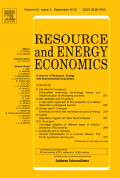
RESOURCE AND ENERGY ECONOMICS
Innovating Solutions for Energy Policy ChallengesRESOURCE AND ENERGY ECONOMICS is a premier academic journal published by ELSEVIER, specializing in the intricate fields of economics and econometrics with a particular focus on the intersection of resource management and energy policy. Established in 1993, the journal has been a vital platform for scholars and professionals, contributing to significant advancements in the understanding of economic aspects surrounding natural resources and energy systems. With an impressive impact factor and ranking in the top quartile (Q1) of its category, it is recognized for its rigorous peer-reviewed research that informs both academic inquiry and practical applications in the industry. The journal is based in the Netherlands and caters to a global audience, fostering interdisciplinary discussions aimed at addressing pressing environmental and economic challenges. Accessible primarily through institutional subscriptions, RESOURCE AND ENERGY ECONOMICS continues to shape the discourse in its field, making it an essential read for researchers, policymakers, and practitioners striving for innovative solutions in resource and energy economics.
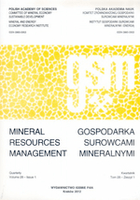
Gospodarka Surowcami Mineralnymi-Mineral Resources Management
Advancing Knowledge in Economic GeologyGospodarka Surowcami Mineralnymi-Mineral Resources Management is a pivotal academic journal published by the Polish Academy of Sciences and the Mineral and Energy Economics Research Institute. Focusing on the field of Economic Geology, this journal plays a critical role in disseminating research on mineral resources management, exploring the economic implications of mineral exploitation, sustainability practices, and technological advancements in resource extraction. With an ISSN of 0860-0953 and an E-ISSN of 2299-2324, the journal has established itself as a respected source of knowledge, holding a Q3 ranking in its category as of 2023 and demonstrating its relevance within a competitive landscape where it ranks 22nd out of 43 in Economic Geology according to Scopus. Researchers, professionals, and students will find this journal to be an invaluable resource for the latest insights and developments in mineral resource management, contributing significantly to the overarching conversations in geology and environmental science.
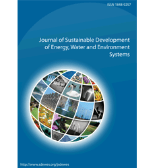
Journal of Sustainable Development of Energy Water and Environment Systems-JSDEWES
Empowering Research for a Sustainable TomorrowJournal of Sustainable Development of Energy Water and Environment Systems (JSDEWES), published by the International Centre for Sustainable Development of Energy, Water, and Environment Systems, is a premier Open Access journal that has been shaping the discourse surrounding sustainable energy, water management, and environmental systems since its inception in 2013. Based in Croatia, this esteemed journal, bearing the ISSN 1848-9257, emphasizes an interdisciplinary approach, making significant strides within its converged years from 2013 to 2024. With impressive rankings in 2023—Q3 in Energy Engineering and Power Technology, Q2 in Environmental Science (miscellaneous), and noteworthy positions in Renewable Energy, Sustainability and the Environment, and Water Science and Technology—JSDEWES showcases its commitment to advancing knowledge and innovation in crucial areas affecting our planet's sustainability. Designed for an audience of researchers, professionals, and students alike, this journal is pivotal in fostering research that enhances our understanding and implementation of sustainable practices, while its esteemed Scopus rankings further underline its impact and contribution to the field.
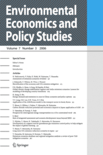
Environmental Economics and Policy Studies
Transforming Economic Perspectives on Environmental ChallengesEnvironmental Economics and Policy Studies is a premier academic journal published by SPRINGER, focusing on the intersection of environmental sustainability and economic policy. With a robust ISSN of 1432-847X and an E-ISSN of 1867-383X, this journal serves as a vital resource for researchers, policymakers, and practitioners looking to understand and address the complex issues surrounding environmental economics. Hailing from Japan, it has carved a significant niche in the field since its inception, achieving impressive rankings with a Q2 classification in both Economics and Econometrics, as well as Management, Monitoring, Policy and Law as of 2023. The journal publishes a wide array of high-quality articles, with an emphasis on empirical research and innovative methodologies that influence public policy and economic decision-making. Notably, its Scopus rankings reflect a respectable position within its disciplines, with a percentile ranking of 74th in Economics and Econometrics. The journal continues to contribute to the discourse on sustainable development with a commitment to fostering interdisciplinary research and understanding. Access to this invaluable resource is available through traditional subscription models, making it an essential addition to academic collections for those passionate about the advancement of environmental economics.
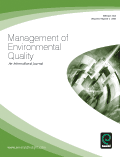
Management of Environmental Quality
Transforming Insights into Action for a Sustainable WorldManagement of Environmental Quality is a premier academic journal published by Emerald Group Publishing Ltd, based in the United Kingdom. With an ISSN of 1477-7835 and an E-ISSN of 1758-6119, this journal is focused on the interdisciplinary field of environmental management, emphasizing the importance of quality and sustainable practices. It has achieved an impressive Q1 ranking across various categories for 2023, including Biochemistry, Genetics and Molecular Biology, Management, Monitoring, Policy and Law, and Public Health, Environmental and Occupational Health, positioning it at the forefront of research. The journal's Scopus ranks in Environmental Science and Biochemistry underscore its significant impact, with a percentile reaching up to 89th. Although it does not operate under an Open Access model, it remains a vital resource for researchers, professionals, and students aiming to advance knowledge and practice in environmental quality management. Covering a broad scope that integrates the latest research findings from 2003 through 2024, this journal serves as an essential platform for disseminating groundbreaking studies that inform policy and foster a deeper understanding of environmental challenges.

JOURNAL OF TRANSPORT ECONOMICS AND POLICY
Innovating policy solutions for global transport challenges.JOURNAL OF TRANSPORT ECONOMICS AND POLICY is a prominent academic journal published by the University of Bath, dedicated to advancing the field of transport economics and related policy issues. Since its inception, this journal has been a pivotal platform for disseminating high-quality research, with a focus on economic theories, analytical methods, and policy implications within the transport sector. With a robust historic timeline of publication spanning from 1982 to the present, the journal boasts a commendable Q3 ranking in esteemed categories including Economics and Econometrics, Management, Monitoring, Policy and Law, and Transportation as of 2023. Although currently not open access, it remains an essential resource for researchers and professionals keen on exploring intricate economic mechanisms that drive transport systems globally. The journal's contributions are crucial for enhancing policy development and fostering informed decision-making among stakeholders, ensuring its significance in shaping future transport economics discourse.

Hydrologie und Wasserbewirtschaftung
Exploring the depths of water management.Hydrologie und Wasserbewirtschaftung, published by the BUNDESANSTALT GEWASSERKUNDE-BFG, stands as a vital open access journal in the field of hydrology and water management since its inception in 1999. Based in Germany, this journal aims to disseminate high-quality research related to water resources, environmental sustainability, and innovative management strategies. Though it has a Q4 ranking in Water Science and Technology for 2023, and holds a Scopus rank of 113 out of 225, the journal provides an essential platform for researchers, professionals, and students interested in advancing their understanding of water science. With coverage spanning from 1999 to 2018 and a seamless move to an open access model, Hydrologie und Wasserbewirtschaftung remains committed to contributing to the ongoing dialogue around critical water issues. Researchers looking to publish their findings or stay abreast of developments in water science will find this journal indispensable.

Global NEST Journal
Pioneering research for a healthier planet.Global NEST Journal, published by the GLOBAL NETWORK ENVIRONMENTAL SCIENCE & TECHNOLOGY, stands as a vital resource for researchers and practitioners in the field of environmental science. With its established trajectory since 2001 and a current category quartile ranking of Q3 in Environmental Science (miscellaneous), this journal serves as an important platform for disseminating innovative research and insights that address pressing global environmental challenges. Based in Athens, Greece, the journal is accessible to a wide audience, facilitating collaboration and knowledge sharing across disciplines. Despite its open access status being unspecified, the Global NEST Journal aims to enrich the academic community by publishing original research articles, reviews, and case studies on various aspects of environmental science and technology. By fostering a deeper understanding of complex environmental issues, this journal not only enhances academic discourse but also contributes to practical solutions for a sustainable future.
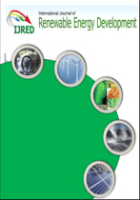
International Journal of Renewable Energy Development-IJRED
Exploring New Frontiers in Renewable Energy DevelopmentThe International Journal of Renewable Energy Development (IJRED), published by DIPONEGORO University in Indonesia, serves as a pivotal platform for scholarly research in the dynamic fields of renewable energy and sustainability. With a dedication to advancing knowledge since its inception in 2012, IJRED has embraced an Open Access model, ensuring that vital research is freely accessible to a global audience. The journal's impressive impact factor and its classification in the Q2 and Q3 quartiles across multiple categories—including Energy Engineering and Power Technology, Environmental Engineering, and Renewable Energy, Sustainability and the Environment—underscore its significance and authority in contemporary energy discourse. Indexed in Scopus, the journal consistently ranks among the top-tier publications, making it an essential resource for researchers, professionals, and students committed to innovating sustainable solutions in the face of climate challenges. Researchers are invited to contribute to this essential body of work as the journal continues to converge impactful research until 2024.

Environmental Engineering and Management Journal
Uniting expertise to shape the future of environmental engineering.Welcome to the Environmental Engineering and Management Journal, a pivotal platform for disseminating knowledge and innovative research in the fields of Environmental Engineering, Management, Monitoring, Policy, and Law. Published by GH Asachi Technical University of Iasi in Romania, this journal has been committed to fostering discussions and advancements in environmental solutions since its inception in 1988, with continuous publication from 2002 to 2024. While classified in the Q4 category across various environmental disciplines in 2023, it remains an important resource for scholars and practitioners navigating the complexities of pollution and environmental management. With an ISSN of 1582-9596 and an E-ISSN of 1843-3707, this journal encourages submissions that address pressing ecological challenges and provide actionable insights. Although currently not open access, it seeks to expand its reach and relevance within the global academic community. Join us as we explore critical environmental issues and contribute to sustainable practices worldwide.